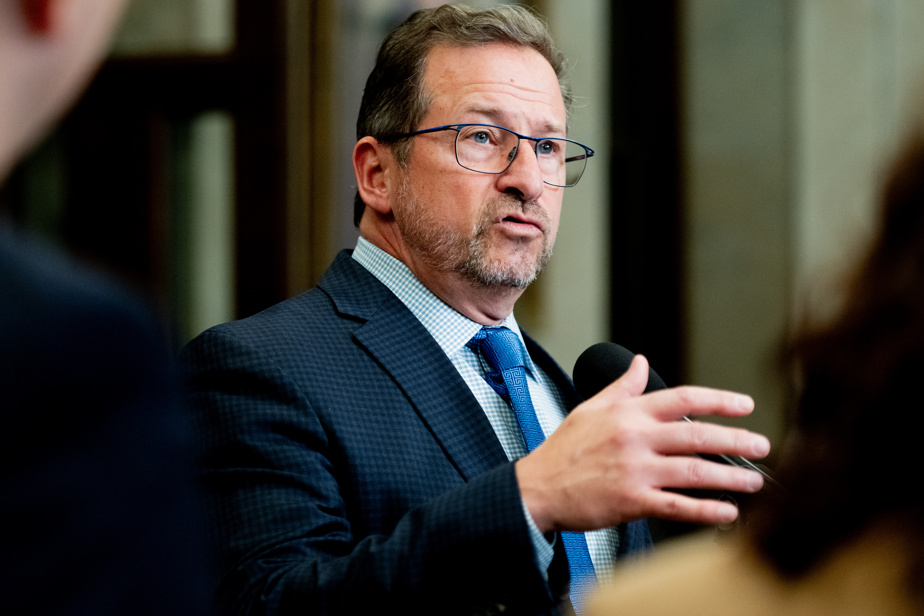(Ottawa) The leader of the Bloc Québécois, Yves-François Blanchet, regrets his past comments on a project for a third road link between Quebec and Lévis and invites federal leaders, including himself, to stick to not encroaching on the fields jurisdiction of the provinces.
“Mind your own business,” he said on the phone Thursday evening, in an interview with La Presse Canadienne, after denouncing the comments he considers “very aggressive” and the lack of “respect” for the National Assembly and the City of Quebec of Prime Minister Justin Trudeau, his minister Jean-Yves Duclos and Conservative leader Pierre Poilievre.
The Conservative leader announced, in an outing earlier in the day, that a federal government he would lead would not invest “not a penny” in a tramway project, but that he would contribute to a third road link project. The Liberals reiterated that they would do precisely the opposite.
However, the Prime Minister of Quebec, François Legault, wants both. He announced a few hours later that he was relaunching the third road link project. It would be a bridge. He also indicated support for the first phase of the tram deployment as developed by the Caisse de dépôt et placement du Québec (CDPQ).
Although the CDPQ report considers that traffic does not justify the third road link project, Mr. Legault invoked “economic security reasons” raised by “stakeholders” to override the experts’ opinion and fulfill this electoral promise initially torpedoed a year ago.
In an open letter published Friday, Mr. Blanchet protests that MM. Trudeau and Poilievre intervened in the debate on mobility in Quebec when it is “none of their business” and they refuse to bow to “the legitimate choice which belongs only to the governments of Quebec and of Quebec”.
In the case of projects studied for years and whose scenarios have been looked at from every angle, the federal government of the moment, he specifies in an interview, does not have the right to distribute funds according to its priorities. .
Should Mr. Blanchet review his methods before giving lessons, when he had declared during the previous electoral campaign to be in favor of a third road link and to this day he still reiterates that he is in favor of a proposed tram?
“I was actually kind of not minding my own business,” he concedes. This was, according to him, due to “the naivety of my youth as party leader because the media put unbearable pressure at the time to make me take a position.”
It is now clear in his mind that it is necessary for the Bloc to “resign itself to what is its role” in a context where “attacks” are increasing.
Pierre Poilievre, declared the Bloc leader, is “as centralist” and does “as much interference” in provincial jurisdiction as Justin Trudeau. Above all, he notes that Mr. Poilievre took “an enormous, enormous risk” by having demonstrated that he had “no respect for what the population of Quebec wants or does not want.”
Mr. Blanchet cannot digest the “demagogue” nature of the Conservative leader’s assertions when he presents the cost of the 28 km tram network project combined with the tunnel to the South Shore as being the equivalent of “$28,000 to every family in the greater Quebec region.”
“If that’s not a good idea, it means that the Montreal metro is not a good idea, or the Paris metro. Large cities with significant densification need public transportation facilities,” he summarizes.
In fact, Mr. Poilievre claims, it’s “more taxes for a project people don’t want.” The Conservative leader, in passing, denounced the “car war” with which the Liberal government and the Bloc are “obsessed,” which “ignore” people in the suburbs and regions.
“In the “obsessed” category, I’m an amateur; Pierre Poilievre is a professional, dismisses Mr. Blanchet straight away. I want people who have to travel from point A to point B to work, study, have fun, visit Quebec as tourists, to have access to a transportation system that is efficient and coherent. »
The Bloc leader also believes that the less expensive alternative solution proposed by the federal government consisting of lowering the deck of the Quebec bridge, which Ottawa has just purchased, so as to allow the passage of heavy goods vehicles is “a patent” which is “dangerously improvised.”
The plan unveiled Wednesday by the CDPQ recommends a tram project, a rapid bus system (BRT) and reserved lanes to improve mobility.
He also suggests building a tunnel under the river dedicated solely to the tramway, but Prime Minister Legault did not go as far as agreeing to carry out this phase on Thursday.
The tram network would cost 7 billion and the bill for the tunnel tram would be 4 billion, in today’s dollars. It would take around 4.5 billion for reserved lanes and BRT. Thus, the total bill for the project would be at least 15.5 billion.
Ottawa originally committed to funding 40% of the costs of the light rail project. However, that was before the bill exploded.




